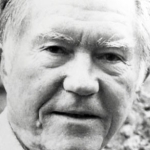Cold nights outside the taverns in Wyoming
pickups and big semis lounge idling, letting their
haunches twitch now and then in gusts of powder snow,
their owners inside for hours, forgetting as well
as they can the miles, the circling plains, the still town
that connects to nothing but cold and space and a few
stray ribbons of pavement, icy guides to nothing
but bigger towns and other taverns that glitter and wait:
Denver, Cheyenne.
Hibernating in the library of the school on the hill
a few pieces by Thomas Aquinas or Saint Teresa
and the fragmentary explorations of people like Alfred
North Whitehead crouch and wait amid research folders
on energy and military recruitment posters glimpsed
by the hard stars. The school bus by the door, a yellow
mound, clangs open and shut as the wind finds a loose
door and worries it all night, letting the hollow
students count off and break up and blow away
over the frozen ground.

Comment form: